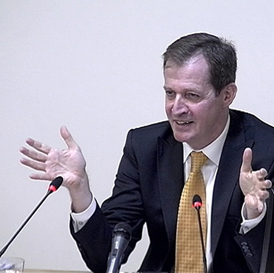Alastair Campbell slams ‘putrid press’
As Alastair Campbell tells the Leveson inquiry elements of the press have become ‘putrid’, a former investigator claims data chiefs refused to take action against newspapers on illegal information.
Mr Campbell, a former journalist, submitted 55 pages of written evidence to the inquiry on press standards, saying that whilst the “good journalists are still in the majority”, competitive pressure are having a severe impact on media ethics.
“Editors are under enormous pressure. Journalists are under enormous pressure.
“In most of the newsrooms, there are fewer of them with more pages and online space to fill, and less time to do it. These are important factors, but they should not be excuses to let standards and ethics slip.”
Blaming managers who tried to save money by cutting staff he said the press was “frankly putrid in many of its elements”.

Mr Campbell highlighted one incident where the Daily Mail reported that his father’s death even though he was still alive.
On phone hacking he said he has apologised to Carole Caplin, Cherie Blair’s lifestyle consultant, for accusing her of tipping off newspapers after it emerged that Ms Caplin’s phone had been hacked by the News of the world
He went on to say he had his own suspicions that his phone had been hacked and had also been visited by officers from Operation Tuleta, the police inquiry into other privacy intrusions beyond phone hacking, who briefed him on computer hacking – although the former spin doctor stressed he was not told he was a victim.
Regulatory ‘failures’
The Leveson inquiry later heard that the former deputy head of the UK’s data protection authority refused to pursue newspapers over illegal purchases of private information.
Alec Owens, who was the Information Commissioner’s Office’s (ICO) senior investigating officer from 1999 to 2005, said he urged his bosses to take action against newspapers.
He accused Deputy Commissioner Francis Aldhouse and Commissioner Richard Thomas of claiming they were powerless to stop the illegality, telling the inquiry: “I said, ‘we can go for everybody from the blagger right up to the newspaper’.
“At which point there was a look of horror on Mr Aldhouse’s face, and he said, ‘we can’t take them on, they’re too big for us’.
“Mr Thomas, sort of bemused, deep in thought, just said, ‘fine, thank you very much Alec, pass my compliments on and congratulations to the team from me, job well done’.”
Evidence of the illegal access of private data was recovered in a raid on the Hampshire home of private investigator Steve Whittamore in 2003, the inquiry heard.
Mr Owens, a former Merseyside Police detective inspector, said: “We had a paper chain right the way up and down.”
Whittamore admitted his own involvement in the illegality but refused to implicate any journalists, the inquiry heard.
Mr Owens said: “He didn’t say anything then formally, but he indicated that he wouldn’t deny his wrong-doing, but please don’t ask him about the press because he’s not going to say anything about them.”
Whittamore was convicted in 2005 of illegally accessing data and passing it to journalists.
Peter Hain computer hack allegations
Meanwhile it emerged that Metropolitan Police officers from Operation Tuleta are investigating allegations that the MP Peter Hain’s computer was hacked while he was Northern Ireland Secretary.
Mr Hain’s spokesman said: “Earlier today Peter Hain met with Metropolitan Police officers leading Operation Tuleta regarding an investigation into the alleged hacking of his official and personal computers during his time as Secretary of State for Northern Ireland.”
He added: “Given the serious and sensitive nature of this ongoing investigation, it would not be appropriate to comment further at this stage.”
Mr Hain, who is now MP for Neath, had access to classified information during his two-year tenure in the Northern Ireland role, which ended in June 2007, including highly sensitive details about informers.
A News International spokeswoman has said the company was “co-operating fully with the police” on all investigations.
